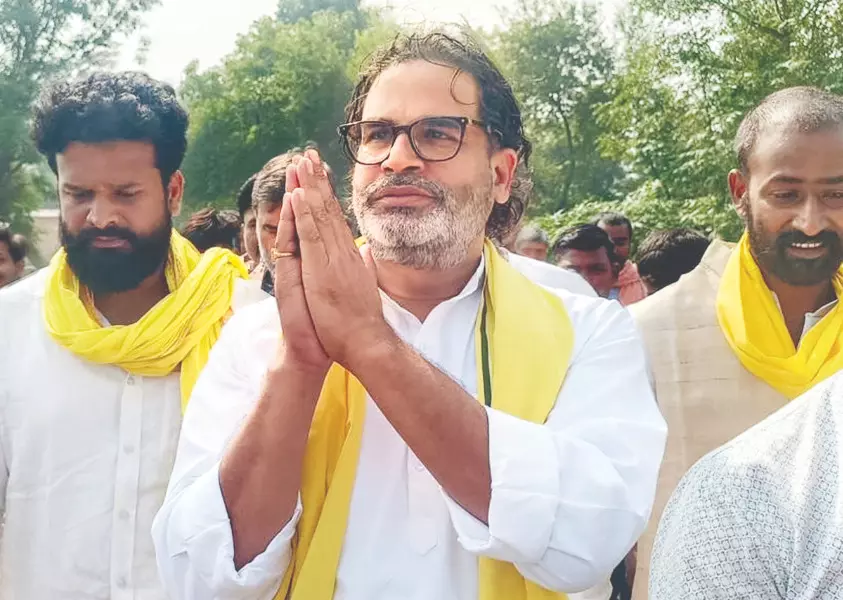Man behind many electoral wins stumbles in his own Bihar battle

Patna: Prashant Kishor, long credited with crafting victories for some of India’s most prominent politicians, faced a harsh reversal in Bihar as his own Jan Suraaj Party, once touted as the “X factor” in the Bihar election, failed to win a single seat in the Assembly elections. The strategist-turned-politician had entered the contest with bold predictions, both for his fledgling organisation and for the Janata Dal United, a party where he once served as national vice president. The outcome has instead left his political future clouded with uncertainty.
Kishor had described the Jan Suraaj Party’s possible trajectory as “arsh par ya farsh par”, framing the maiden electoral test as one that would either elevate the party or crush it. The latter appears closer to reality. Despite attempts to contest all 243 seats, the party has drawn a blank. Election Commission data shows that most JSP candidates polled under 10 per cent of the vote, leading to the forfeiture of their security deposits.
The party’s strongest performance came from Naveen Kumar Singh alias Abhay Singh in Marhaura, where he finished second but trailed the RJD’s Jitendra Kumar Rai by 27,928 votes. In several seats, JSP candidates even lagged behind NOTA. In Forbesganj, for instance, JSP nominee Mohammad Ekramul Haque managed only 977 votes, compared to 3,114 NOTA votes.
A handful of candidates crossed the 10 per cent mark, including YouTuber Manish Kashyap with 17.2 per cent in Chanpatia and Sarfaraj Alam with 16.26 per cent in Jokihat. However, Bhojpuri singer Ritesh Pandey secured just 7.45 per cent votes.
Kishor, who had claimed his party would win 150 seats, did not contest the polls. JSP’s Bihar president Manoj Bharti admitted the party failed to persuade voters but vowed to continue its efforts. Spokesperson Pavan K Varma said the party would undertake a “serious review” of its performance.
Before nominations closed, the party accused senior BJP leaders, including Union Home Minister Amit Shah, of creating conditions that prevented some nominees from filing their papers.
His other prominent prediction, aimed at the JD(U), has also unravelled. Kishor had asserted the party would win “not more than 25 seats”. Instead, Chief Minister Nitish Kumar’s JD(U) has secured 85 seats, its strongest performance since 2010, when it crossed the 100 mark while contesting a larger slate than the 101 seats it fought this time. JD(U) leaders, including Kumar, have openly ridiculed Kishor’s assessment.
For the 47-year-old, the setback comes barely a year after he launched the Jan Suraaj Party following a months-long “pada yatra” across Bihar. The march was presented as a state-wide outreach effort, but it has not translated into electoral gains. The defeat leaves Kishor at a crossroads, raising doubts about how he will reposition himself in a landscape where the opposition INDIA bloc has also suffered heavy losses.
Kishor has often drawn reactions for his political forecasts. A year earlier, he had said the BJP was likely to cross 300 seats in the Lok Sabha elections. He has argued that India always retains space for alternative forces, stating, “It is not the opposition, but the parties in the opposition, which are weak in this country.” His record as a strategist spans work with leaders such as Narendra Modi, Nitish Kumar, Mamata Banerjee, Arvind Kejriwal, Jagan Mohan Reddy, Uddhav Thackeray and M K Stalin. Several of those assignments succeeded, though not all, a point frequently raised by his critics.
His own political journey has been marked by abrupt shifts. Nitish Kumar appointed him as an advisor with cabinet rank in 2015, and by 2018 Kishor had risen to the JD(U)’s national vice presidency. Speculation grew that he might be groomed as a successor. That trajectory ended when he publicly criticised Kumar’s stand on the Citizenship Amendment Act, leading to his expulsion. He then announced the “Baat Bihar Ki” initiative, which did not take off.
After steering Mamata Banerjee’s successful 2021 campaign in West Bengal, Kishor briefly explored a plan to “revive” the Congress by presenting a structural blueprint, though talks collapsed. The Bihar results now mark his toughest political moment yet, leaving the architect of many electoral triumphs searching for a path forward in his own stalled campaign.



